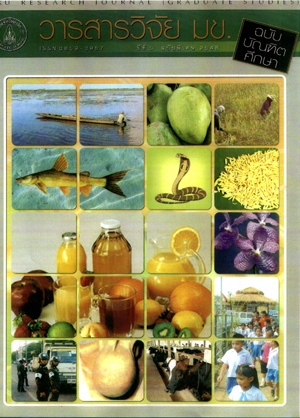การประยุกต์กระบวนการมีส่วนร่วมในการปรับเปลี่ยน พฤติกรรม การปองกันอุบัติภัยจราจรของนักเรียนระดับ มัธยมศึกษาตอนปลาย จังหวัดขอนแก่น Application of a Participation Process in Behavioral Modification on Road Traffic Accidents among Students in Secondary School
Keywords:
participation process, behavioral modification on road traffic accidents, secondary schools studentsAbstract
การวิจัยกึ่งทดลอง (Quasi Experimental Research) คเงนี้มีวัตถุประสงต์เพื่อศึกษาการประยุกต์ กระบวนการมีส่วนร่วมในการปรับเปลี่ยนพฤติกรรมการปองกันอุบัติภัยจราจรของนักเรียนระดับมัธยมศึกษา ตอนปลาย จังหวัดขอนแก่น กลุ่มตัวอย่างเป็นนักเรียนระดับมัธยมศึกษาตอนปลาย จำนวน 90 คน แบ่งเป็นก ลุ่มทดลอง 45 คน และกลุ่มเปรียบเทียบ 45 คน เก็บรวบรวมข้อมูลระหว่างเดือนพฤศจิกายน 2547 ถึงเดือน มกราคม 2548 ผลการวิจัย พบว่า ภายหลังการทดลอง กลุ่มทดลองมีความรู้เกี่ยวกับอุบัติภัยจราจร การรับรู้ โอกาสเสี่ยง การรับรู้ความรุนแรง การรับรู้ประโยชน์ที่จะได้รับ การรับรู้อุปสรรคของการปฏิบัติ และพฤติกรรม ปฏิบัติตนเพื่อปองกันอุบัติภัยจราจรดืฃึ้นกว่าก่อนการทดลอง และดีกว่ากลุ่มเปรียบเทียบอย่างมีนัยสำคัญ ที่ระดับ 0.05 และมีพฤติกรรมการมีส่วนร่วมในการจัดกิจกรรมตามโครงการอยู่ในระดับปานกลาง จากผลการ วิจัยดังกล่าวแสดงให้เห็นว่า กระบวนการมีส่วนร่วมในการปรับเปลี่ยนพฤติกรรมการป้องกันอุบัติภัยจราจร มีผลทำให้นักเรียนมีความรู้เกี่ยวกับอุบัติภัยจราจร การรับรู้โอกาสเสี่ยง การรับรู้ความรุนแรง การรับรู้ประโยชน์ ที่จะได้รับ การรับรู้อุปสรรค และมีพฤติกรรมการปฏิบัติตนเพื่อป้องกันอุบัติภัยจราจรดีขึ้น ซึ่งสามารถน่าไป ประยุกต์1ข้กับนักเรียน นักศึกษาในโรงเรียนหรือสถาบันการศึกษาอื่นๆ ต่อไป
The purpose of this quasi-experimental research was to study the application of a participation process on behavioral modification with respect to road traffic accidents among secondary school students in Khon Kaen Province. The sample consisted of two randomly selected classes of 90 secondary school students, divided into 45 students in the experimental group and 45 students in the control group. The duration of data collection from November 2004 to January 2005.The results revealed that after the improvements there were significant (p < 0.05) in the experimental group in knowledge, perceived susceptibility, perceived severity, perceived benefits, perceived barriers, and health practice behavior. The participatory behavior of most students, according to the projects, were ‘moderate’. This research found that after the application of a participation process in behavioral modification on road traffic accidents, secondary school students have better knowledge, perceived susceptibility, perceived severity, perceived benefits, perceived barriers and better health practice behavior. This can be applied to students in other schools.



